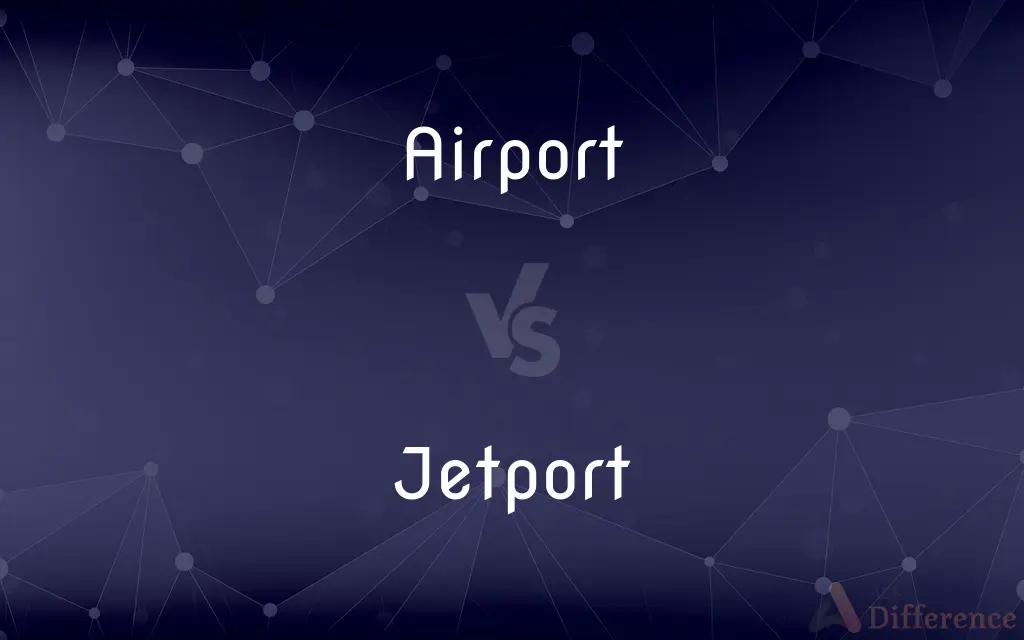Airport vs. Jetport — What's the Difference?
By Fiza Rafique & Urooj Arif — Updated on March 14, 2024
Airports serve all aircraft types, while jetports are tailored for jet aircraft.

Difference Between Airport and Jetport
Table of Contents
ADVERTISEMENT
Key Differences
Airports are complex facilities designed to accommodate a wide range of aircraft, including commercial airliners, private planes, and cargo aircraft. They often have multiple runways, terminals, and support services. Jetports, in contrast, are specifically designed for jet aircraft operations and may feature longer runways and facilities optimized for jets' higher speeds and maintenance needs.
The term "airport" is universally recognized and used, encompassing the entire aviation infrastructure necessary for air travel. "Jetport" is less commonly used and often signifies an airport with a focus on or suitability for jet aircraft, reflecting a modern approach to air travel.
Airports cater to a diverse set of aviation activities, including passenger travel, cargo handling, aircraft maintenance, and sometimes military operations. Jetports, while also potentially supporting a range of activities, emphasize facilities and services tailored to jet airplanes, such as advanced navigation systems and rapid refueling capabilities.
Infrastructure at airports is designed with a variety of aircraft in mind, from small propeller planes to large jetliners, which necessitates a broad range of runway lengths, widths, and surface types. Jetports, however, might prioritize longer and stronger runways to accommodate the takeoff and landing requirements of larger, faster jet aircraft.
Services at airports include passenger amenities like lounges, retail outlets, and transportation links, aimed at a broad spectrum of travelers. Jetports might offer more specialized services that cater to the needs of jet travelers, potentially including more luxurious facilities or streamlined customs and immigration processes for international flights.
ADVERTISEMENT
Comparison Chart
Aircraft Types
All, including propeller planes and jets
Primarily jet aircraft
Runway Requirements
Varied, to accommodate different aircraft sizes and types
Longer and stronger, for jet takeoffs and landings
Usage
Passenger, cargo, military, general aviation
Often focused on commercial and private jet travel
Facilities
Broad range, including terminals and maintenance hangars
Optimized for jet aircraft, possibly with advanced features
Services
Diverse, catering to all travelers
May include specialized services for jet travelers
Compare with Definitions
Airport
Serves a wide range of aircraft.
The airport accommodated everything from small prop planes to large airliners.
Jetport
Potentially offers luxury amenities.
The jetport's exclusive lounge catered to business and first-class jet travelers.
Airport
Has varying runway specifications.
The airport's runways were designed to support both light aircraft and heavy jets.
Jetport
May emphasize modern facilities.
The jetport boasted state-of-the-art navigation and safety systems.
Airport
Includes extensive facilities.
The airport's new terminal featured numerous passenger amenities.
Jetport
Tailored for jet aircraft.
The jetport's runways were specially designed for large, fast jets.
Airport
Offers diverse services.
From cargo handling to aircraft maintenance, the airport was a hub of activity.
Jetport
Requires specific infrastructure.
The jetport's infrastructure was built to withstand the demands of jet operations.
Airport
Accessible to general aviation.
The airport was a popular choice for private pilots and general aviation enthusiasts.
Jetport
Focuses on jet travel services.
The jetport offered quick turnaround services for private jets.
Airport
An airport is an aerodrome with extended facilities, mostly for commercial air transport. Airports often have facilities to park and maintain aircraft, and a control tower.
Jetport
An airport equipped for jet aircraft.
Airport
A place where aircraft take off and land, usually equipped with hard-surfaced landing strips, a control tower, hangars, aircraft maintenance and refueling facilities, and accommodations for passengers and cargo.
Jetport
(dated) An airport served by jet aircraft.
Airport
An airfield (an area designated for the takeoff and landing of aircraft), including one or more runways and (for commercial airports) one or more passenger terminals.
Airport
An airfield equipped with control tower and hangers as well as accommodations for passengers and cargo
Common Curiosities
Are jetports always larger than airports?
Not necessarily; the size depends on the jetport's capacity and services, not just the fact that it serves jets.
Do all major cities have jetports?
Many major cities have airports that can be considered jetports due to their facilities, but the specific use of "jetport" varies.
What is the primary difference between an airport and a jetport?
Airports serve a broad range of aircraft, while jetports are specifically designed for jet aircraft.
Can military jets use civilian jetports?
Military jets can use civilian jetports if necessary, especially in emergencies or for specific operations, assuming the facilities meet military requirements.
Is there a difference in the services offered at airports and jetports?
Jetports might offer more specialized services tailored to jet aircraft and their passengers, while airports provide a broader range of services for all types of aviation activities.
Can propeller planes use a jetport?
While jetports are optimized for jets, they may still accommodate propeller planes, depending on the facility.
Do airports and jetports have different safety standards?
Both must meet rigorous safety standards, but jetports might have additional requirements due to the specific needs of jet aircraft.
Can jetports facilitate supersonic travel?
As supersonic travel evolves, jetports with suitable runways and facilities might become key hubs for these aircraft.
How do jetports handle international flights differently from airports?
Jetports handling international flights may have streamlined customs and immigration facilities to efficiently process passengers.
Why might a city opt to build a jetport instead of a traditional airport?
A city might build a jetport to cater to increasing jet travel demand, provide more efficient services for jets, or accommodate future aviation trends.
How do environmental considerations differ between airports and jetports?
Both types of facilities face environmental challenges, but jetports might adopt more advanced technologies for noise and emission reduction.
Do jetports offer faster check-in and security processes?
Some jetports might streamline these processes, especially for private jet passengers, to offer a more efficient experience.
Are jetports more modern than airports?
Jetports may feature more modern design and technology, especially if built or renovated with a focus on jet aircraft.
Is it more expensive to operate a jet from a jetport than an airport?
Costs can vary based on the services used and the jetport's pricing structure, but specialized facilities might lead to higher fees.
How do jetports impact local economies compared to airports?
Both can significantly impact local economies by facilitating travel and trade, but jetports may attract more business and private travel, potentially driving higher-end economic activities.
Share Your Discovery

Previous Comparison
Bullion vs. Ingot
Next Comparison
Exonerate vs. VindicateAuthor Spotlight
Written by
Fiza RafiqueFiza Rafique is a skilled content writer at AskDifference.com, where she meticulously refines and enhances written pieces. Drawing from her vast editorial expertise, Fiza ensures clarity, accuracy, and precision in every article. Passionate about language, she continually seeks to elevate the quality of content for readers worldwide.
Co-written by
Urooj ArifUrooj is a skilled content writer at Ask Difference, known for her exceptional ability to simplify complex topics into engaging and informative content. With a passion for research and a flair for clear, concise writing, she consistently delivers articles that resonate with our diverse audience.
















































